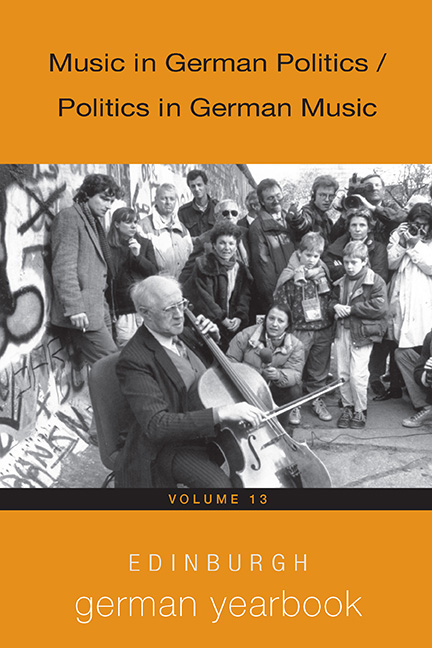“Volk eilt herzu”: Beethoven’s Opera Fidelio in Dresden on October 7 and 8, 1989, and Its Ambivalent Afterlife
Published online by Cambridge University Press: 26 May 2022
Summary
“VOLK EILT HERZU” (The people rush in): This laconic stage direction in the penultimate scene of Beethoven's Fidelio (1805, revised 1814) offers great potential for identification precisely insofar as this “Volk,” what it is and what it does, its association with the profound ideals and longings articulated in the music and especially the choral passages, can be endlessly reinterpreted. Hence Fidelio's appropriation across the political spectrum in the last two centuries. “Volk eilt herzu”—the literal and symbolic arrival of the people, of the masses—this, no less than Leonore's inspirational loyalty to Florestan, shaped the circumstances of and response to the opera's production and performance at a key time and place in the GDR's final phase, namely Dresden on October 7 and 8, 1989. This is the focus of the first part of this essay. The second part consists of a brief reflection on this production's thirty-year survival in the repertoire in Dresden. Insofar as it forms the production's material and symbolic environment, this is itself a stage for the contests for meaning and ownership of the term “Volk” in a new age of populism. The “Volk” is a German lieu de mémoire in Pierre Nora's sense, both multifaceted and notoriously vague, indeed often unthinkingly employed. Moreover, “Volk” as cultural or racial collective both overlaps and clashes with “Volk” as source and site of democratic impulses or grassroots refusal. The “Volk” of the 1989 Dresden Fidelio, whether at the time or thirty years later, needs to be understood in this landscape.
Dresden on October 7–8, 1989, and Fidelio at the Semperoper
On October 9, 1989, the special edition of Neues Deutschland celebrating the state's fortieth birthday declared: “Die Entwicklung der Deutschen Demokratischen Republik wird … das Werk des ganzen Volkes sein” (The development of the German Democratic Republic will be the achievement of the whole people). Meanwhile, though, the “Volk” was giving this rhetoric a content very different to that intended by the SED. By no means all the people were protesting, and even those who were wanted notably different things. Nonetheless, the “Volk” proceeded to disturb the celebrations decisively, some by crowding onto the streets, that is, onto the stage that the state had hitherto monopolized, and some by seeking to exit not just this stage, but the state itself.
- Type
- Chapter
- Information
- Edinburgh German Yearbook 13Music in German Politics/Politics in German Music, pp. 115 - 132Publisher: Boydell & BrewerPrint publication year: 2022

